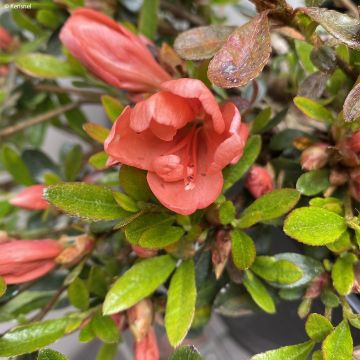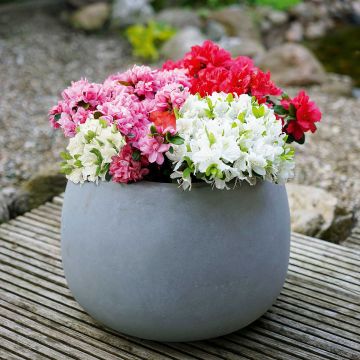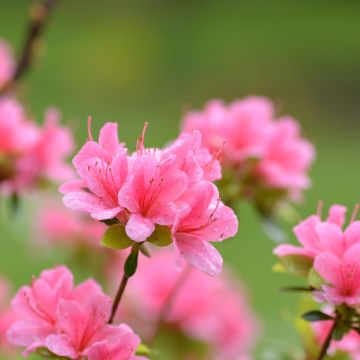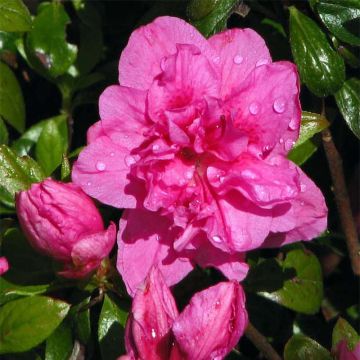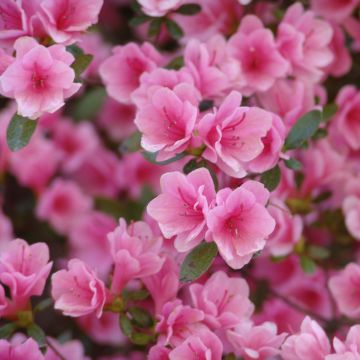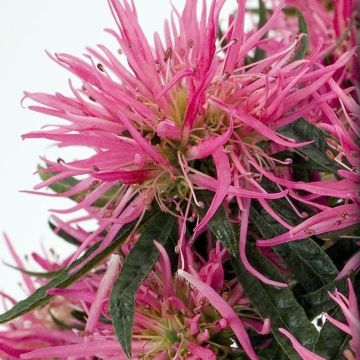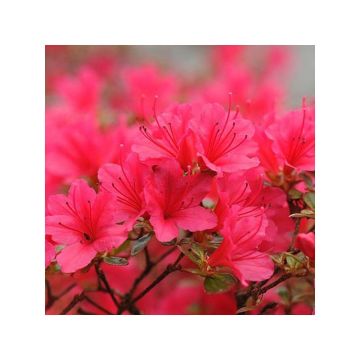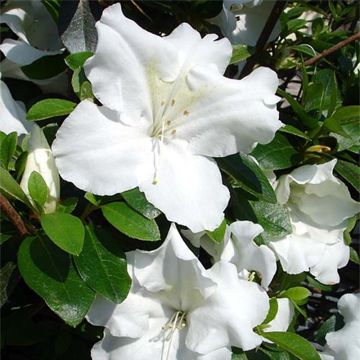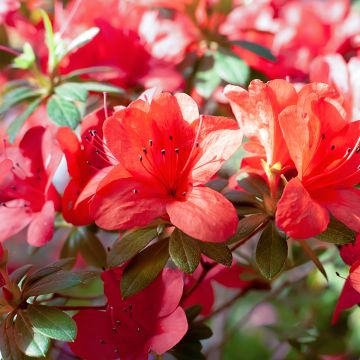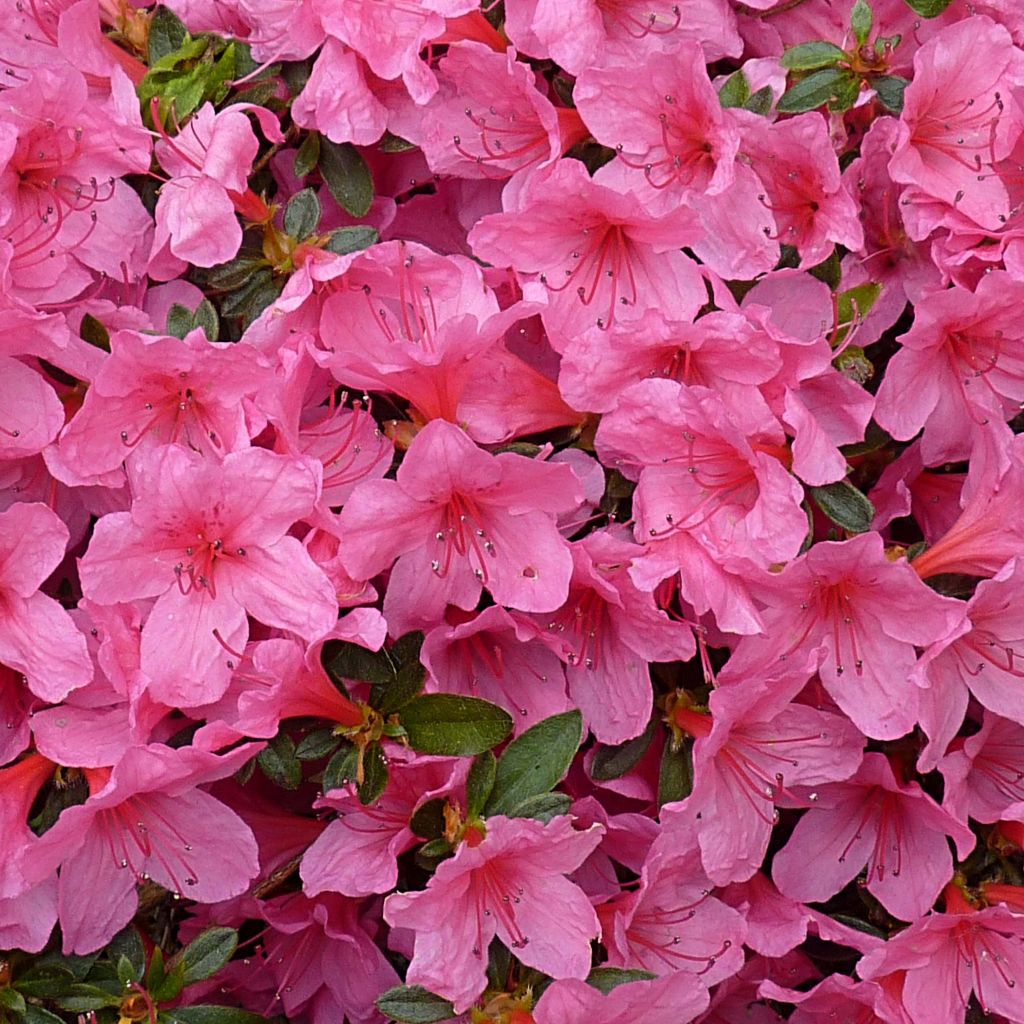

Azalea japonica Mme Van Hecke
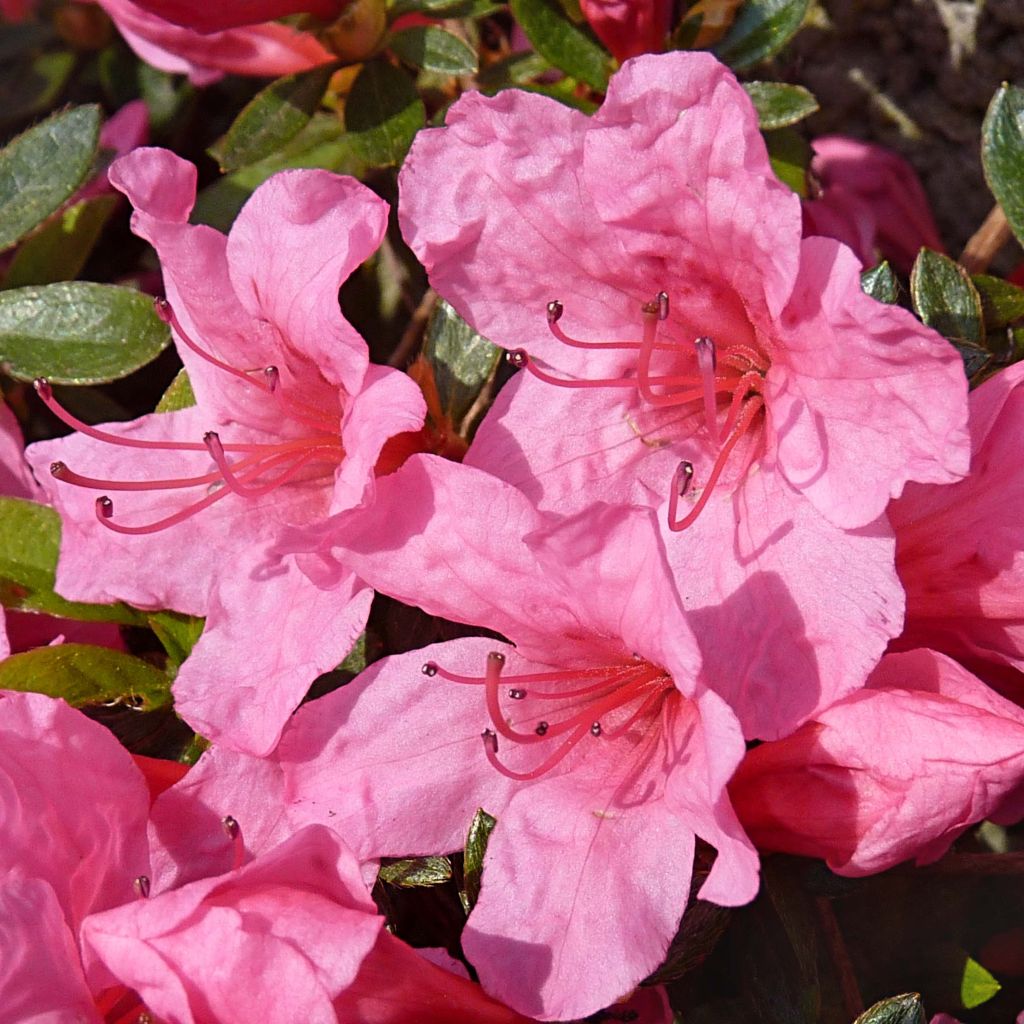

Azalea japonica Mme Van Hecke
Azalea japonica Mme Van Hecke
Rhododendron (Azalea) japonica Mme Van Hecke
Japanese Azalea
This item cannot be shipped to the selected country
Delivery charge from €5.90
Delivery charge from €5.90
More information
Schedule delivery date,
and select date in basket
This plant carries a 24 months recovery warranty
More information
We guarantee the quality of our plants for a full growing cycle, and will replace at our expense any plant that fails to recover under normal climatic and planting conditions.
From €5.90 for pickup delivery and €6.90 for home delivery
Express home delivery from €8.90.
From €5.90 for pickup delivery and €6.90 for home delivery
Express home delivery from €8.90.
Does this plant fit my garden?
Set up your Plantfit profile →
Description
The 'Madame Van Hecke' Japanese Azalea is a variety cultivated for its multitude of medium-sized, luminous soft pink flowers, which appear in spring. It forms a small bushy, rounded evergreen shrub, wider than it is high, covered in dark green foliage that turns bronze with the passing seasons. Its small size makes it ideal for planting in shady gardens where space is at a premium, or to decorate a window box. It is hardy and easy to grow, as long as it has a semi-shaded position and moist, well-drained, lime-free soil that is neither too dry nor too wet.
The 'Madame Van Hecke' Azalea is part of a series of evergreen hybrids very similar to the original Rhododendron kaempferi which was created in 1921. These shrubs do well in cool, damp temperate climates with distinct seasons.
'Madame Van Hecke' or 'Mme Van Hecke' is a small variety with a dense, rounded habit that spreads with age. Slow-growing, it reaches about 60 cm (23.6 in) in height and 80 cm (31.5 in) in spread. Its truly dazzling flowers bloom in May and last for a considerable time. The medium-sized flowers, about 4 to 5 cm (1.6 to 2 in) in diameter, with beautifully wavy edges, are a superb shade of soft pink. They are funnel-shaped and arranged in terminal clusters of 4 to 5. The evergreen foliage consists of small, simple, elliptical leaves with smooth edges, arranged alternately on the branches. They are light green in spring whilst the late summer foliage is dark green with a glossy finish, turning bronze with the cold weather. Azaleas and Rhododendrons have a shallow root system that always needs to be kept moist, but they also dislike waterlogged soil which would suffocate the roots.
Japanese azaleas thrive in cool climates with distinct winters, planted in humus-rich and ericaceous soil. They are beautiful evergreen shrubs for borders or containers, attractive all year round. They are a perfect accompaniment to heathers, Japanese maples, or their relatives, Chinese Azaleas, which change colour with the seasons, as well as Japanese camellias, and their graceful, often fragrant, autumn-flowering cousins, the Camellia sasanqua hybrids. This variety, 'Mme Van Hecke', which spreads more in width than in height, allows for playing with levels and filling in the gaps below large ericaceous shrubs. It will look wonderful in a large, cool, moist, shaded rockery or at the front of borders, as well as on a terrace or balcony, in a large, carefully chosen pot with a suitable compost, and watered with lime-free water.
Report an error about the product description
Azalea japonica Mme Van Hecke in pictures
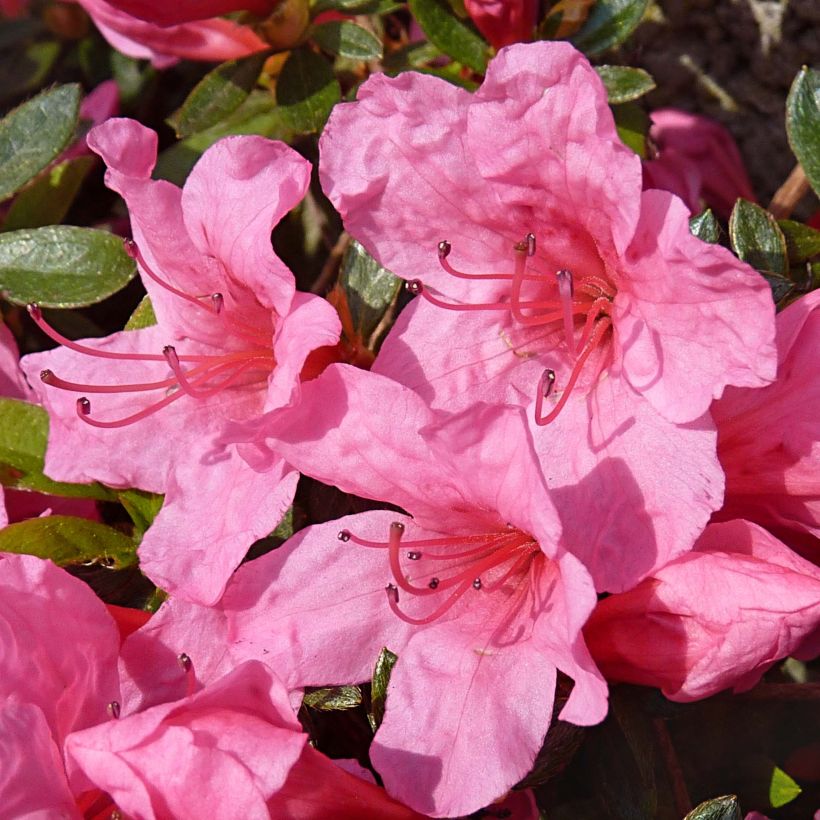

Plant habit
Flowering
Foliage
Botanical data
Rhododendron (Azalea)
japonica
Mme Van Hecke
Ericaceae
Japanese Azalea
Cultivar or hybrid
Other Japanese Azalea
Planting and care
The 'Mme Van Hecke' Japanese Azalea thrives in a rather shaded location, unlike the Chinese Azalea, but its preferred position is in partial shade. Plant it in a humus-rich and well-drained, non-alkaline soil. Make sure not to plant the root ball too deep, it should be level with the surface of the soil. Water copiously with alkaline-free water during dry periods, at least once a week in the first year. In spring, apply a fertilizer for ericaceous plants. Pruning is not essential but it is a good idea to prune lightly after flowering to keep the plant looking neat. Remove spent flowers to encourage new growth. The Azalea suffers from very few diseases when well established outdoors. It can be attacked by weevils that eat the edges of the leaves and rootlets, and by the famous "Rhododendron lace bug", not often causing significant damage. If the soil is chalky or poorly drained, or if the rootball is too deep, the leaves may turn yellow and eventually die.
Planting period
Intended location
Care
This item has not been reviewed yet - be the first to leave a review about it.
Haven't found what you were looking for?
Hardiness is the lowest winter temperature a plant can endure without suffering serious damage or even dying. However, hardiness is affected by location (a sheltered area, such as a patio), protection (winter cover) and soil type (hardiness is improved by well-drained soil).

Photo Sharing Terms & Conditions
In order to encourage gardeners to interact and share their experiences, Promesse de fleurs offers various media enabling content to be uploaded onto its Site - in particular via the ‘Photo sharing’ module.
The User agrees to refrain from:
- Posting any content that is illegal, prejudicial, insulting, racist, inciteful to hatred, revisionist, contrary to public decency, that infringes on privacy or on the privacy rights of third parties, in particular the publicity rights of persons and goods, intellectual property rights, or the right to privacy.
- Submitting content on behalf of a third party;
- Impersonate the identity of a third party and/or publish any personal information about a third party;
In general, the User undertakes to refrain from any unethical behaviour.
All Content (in particular text, comments, files, images, photos, videos, creative works, etc.), which may be subject to property or intellectual property rights, image or other private rights, shall remain the property of the User, subject to the limited rights granted by the terms of the licence granted by Promesse de fleurs as stated below. Users are at liberty to publish or not to publish such Content on the Site, notably via the ‘Photo Sharing’ facility, and accept that this Content shall be made public and freely accessible, notably on the Internet.
Users further acknowledge, undertake to have ,and guarantee that they hold all necessary rights and permissions to publish such material on the Site, in particular with regard to the legislation in force pertaining to any privacy, property, intellectual property, image, or contractual rights, or rights of any other nature. By publishing such Content on the Site, Users acknowledge accepting full liability as publishers of the Content within the meaning of the law, and grant Promesse de fleurs, free of charge, an inclusive, worldwide licence for the said Content for the entire duration of its publication, including all reproduction, representation, up/downloading, displaying, performing, transmission, and storage rights.
Users also grant permission for their name to be linked to the Content and accept that this link may not always be made available.
By engaging in posting material, Users consent to their Content becoming automatically accessible on the Internet, in particular on other sites and/or blogs and/or web pages of the Promesse de fleurs site, including in particular social pages and the Promesse de fleurs catalogue.
Users may secure the removal of entrusted content free of charge by issuing a simple request via our contact form.
The flowering period indicated on our website applies to countries and regions located in USDA zone 8 (France, the United Kingdom, Ireland, the Netherlands, etc.)
It will vary according to where you live:
- In zones 9 to 10 (Italy, Spain, Greece, etc.), flowering will occur about 2 to 4 weeks earlier.
- In zones 6 to 7 (Germany, Poland, Slovenia, and lower mountainous regions), flowering will be delayed by 2 to 3 weeks.
- In zone 5 (Central Europe, Scandinavia), blooming will be delayed by 3 to 5 weeks.
In temperate climates, pruning of spring-flowering shrubs (forsythia, spireas, etc.) should be done just after flowering.
Pruning of summer-flowering shrubs (Indian Lilac, Perovskia, etc.) can be done in winter or spring.
In cold regions as well as with frost-sensitive plants, avoid pruning too early when severe frosts may still occur.
The planting period indicated on our website applies to countries and regions located in USDA zone 8 (France, United Kingdom, Ireland, Netherlands).
It will vary according to where you live:
- In Mediterranean zones (Marseille, Madrid, Milan, etc.), autumn and winter are the best planting periods.
- In continental zones (Strasbourg, Munich, Vienna, etc.), delay planting by 2 to 3 weeks in spring and bring it forward by 2 to 4 weeks in autumn.
- In mountainous regions (the Alps, Pyrenees, Carpathians, etc.), it is best to plant in late spring (May-June) or late summer (August-September).
The harvesting period indicated on our website applies to countries and regions in USDA zone 8 (France, England, Ireland, the Netherlands).
In colder areas (Scandinavia, Poland, Austria...) fruit and vegetable harvests are likely to be delayed by 3-4 weeks.
In warmer areas (Italy, Spain, Greece, etc.), harvesting will probably take place earlier, depending on weather conditions.
The sowing periods indicated on our website apply to countries and regions within USDA Zone 8 (France, UK, Ireland, Netherlands).
In colder areas (Scandinavia, Poland, Austria...), delay any outdoor sowing by 3-4 weeks, or sow under glass.
In warmer climes (Italy, Spain, Greece, etc.), bring outdoor sowing forward by a few weeks.


































